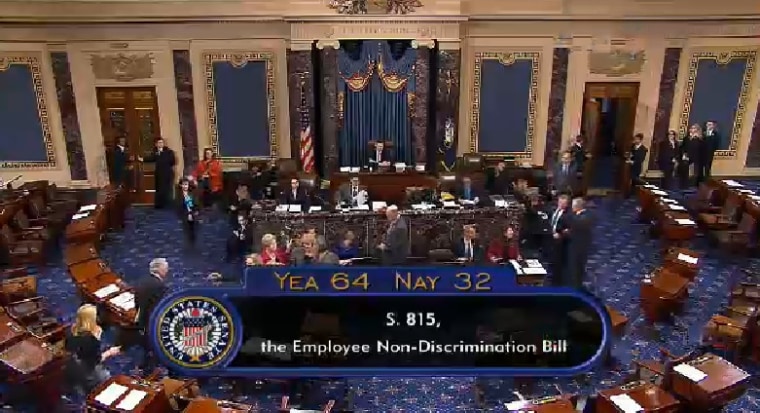
After nearly two decades of effort, the U.S. Senate passed the Employment Non-Discrimination Act with ease this afternoon.
Senate lawmakers on Thursday passed a bill banning workplace discrimination against LGBT individuals in a historic, albeit nominal, victory four decades in the making. The Employment Non-Discrimination Act (ENDA) passed its final vote in the full Senate 64-32, just three days after its first since 1996, when a similar measure failed but just one vote.
This was the vote on final passage, where a simple majority was necessary. In other words, it cleared the 51-vote threshold easily.
Sen. Jeff Merkley (D-Ore.), a lead sponsor, said this afternoon, "Let the bells of freedom ring. We have fought to capture that vision of equality, and liberty, and opportunity, and fairness embedded in our founding documents, in our founding vision. We've taken a huge stride today in that direction."
ENDA enjoyed unanimous support from Senate Democrats, and while most Senate Republicans opposed the legislation, 10 GOP senators -- Susan Collins (R-Maine), Mark Kirk (R-Ill.), Kelly Ayotte (R-N.H.), Jeff Flake (R-Ariz.), Orrin Hatch (R-Utah), Dean Heller (R-Nev.), John McCain (R-Ariz.), Lisa Murkowski (R-Alaska), Rob Portman (R-Ohio), and Pat Toomey (R-Pa.) -- voted with the majority.
The big surprise was Arizona's Jeff Flake, who had announced his opposition to ENDA earlier this week.
The bill now heads to the House, where Speaker John Boehner (R-Ohio) has already said he intends to kill the legislation.
And while we wait to see what happens in the lower chamber -- it's probably best to keep expectations low -- let's not forget that Senate success is itself a breakthrough. The last time ENDA reached the Senate floor, it garnered an underwhelming and unacceptable 49 votes, and earlier this year, it was unclear whether proponents could overcome a Republican filibuster.
And yet, here we are. The bill passed easily, with more GOP support than even proponents expected. It's a reminder that history is bending towards justice with increasing speed, and the question is no longer if these employment protections will be passed into law, but rather, when.